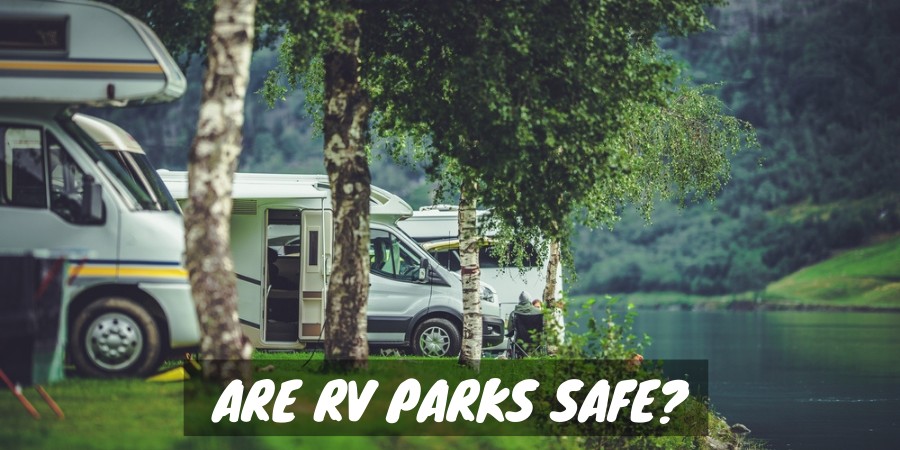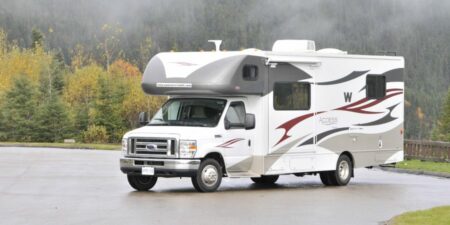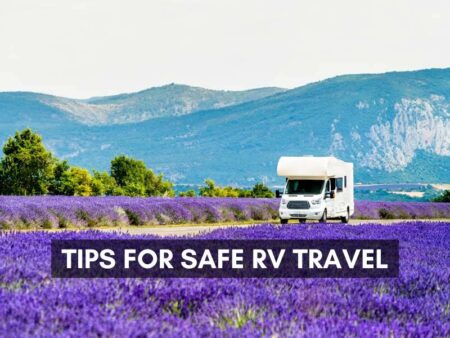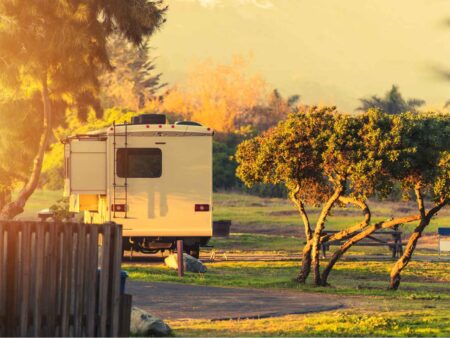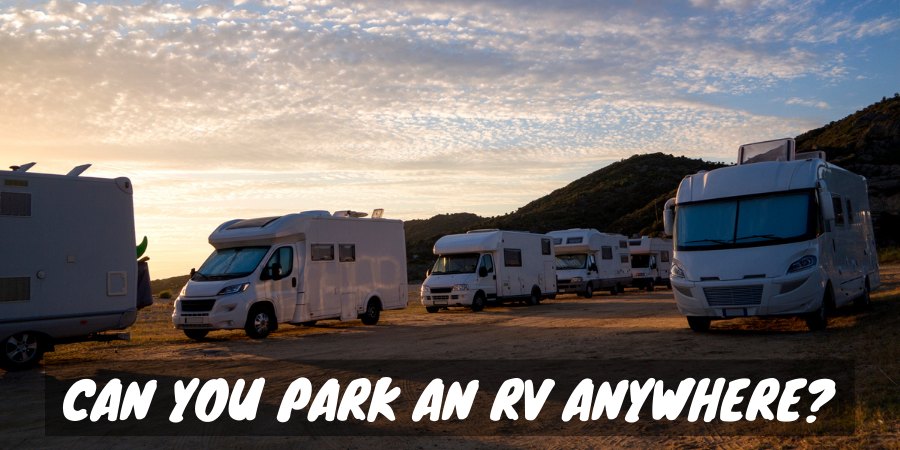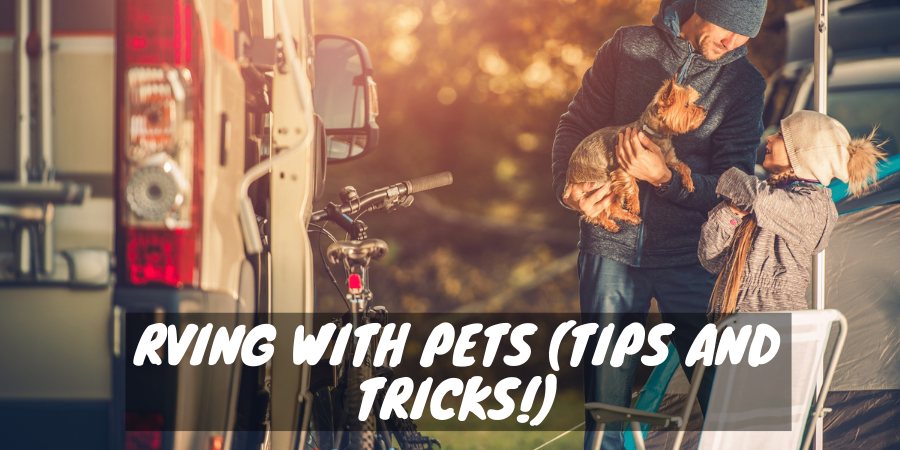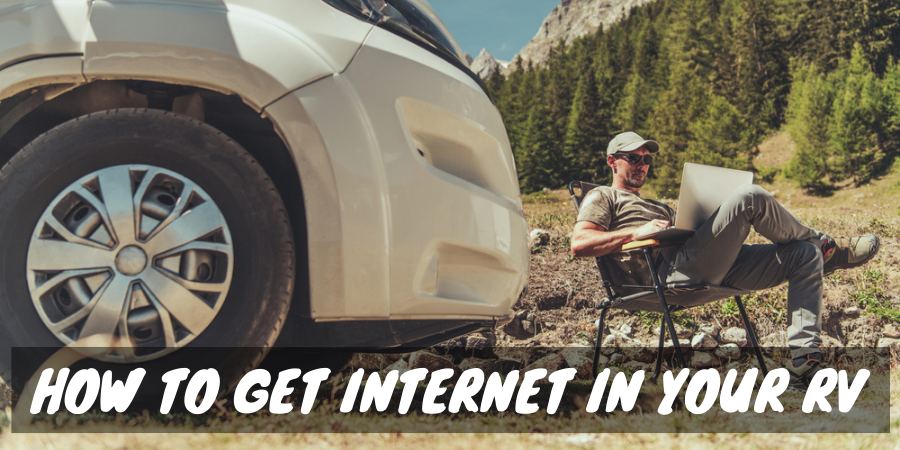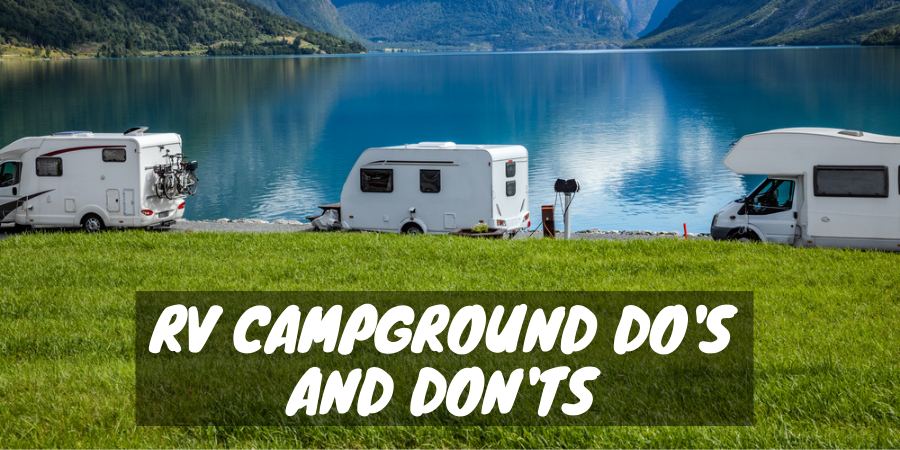Are you planning an RV camping weekend or a long cross-country road trip and wonder if you’ll be safe in RV parks?
RV park safety is a common question newcomers to this type of travel have, and getting to the answer isn’t always as easy as it seems.
Thankfully, most RV parks are perfectly secure and allow you to sleep peacefully at night and enjoy daytime excursions without worry, but there are some that you should avoid.
So how can you tell if an RV park is safe? Follow the tips below from RVers with experience.
When you know which crucial factors play a role in how safe an RV park is, you’ll be ready for a secure and relaxing vacation experience!
Are All RV Parks Safe?
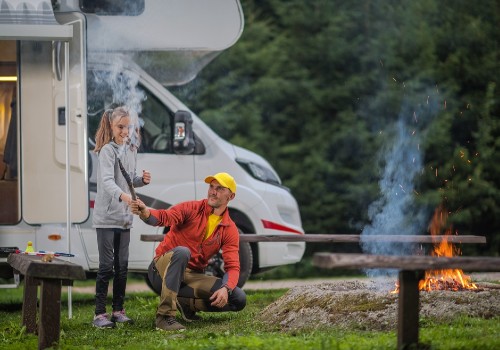
Any avid RVer is bound to tell you that RV parks are safe as a general rule.
Most RV parks provide more security from random crimes when you compare them to parking your camper at off-grid campsites.
It certainly doesn’t mean RV parks are entirely safe and crimes never happen. There are parks that RVers should avoid, so here are some red flags to watch out for and things to expect before booking any RV site.
Location
The RV park’s location can tell you a lot about how safe it is within a city or region. Google is your friend when you’re visiting an unfamiliar area.
As the first order of business, use a crime checker website, such as SpotCrime, where you type in the zip code of your park, and you can see a listing of recent criminal activity right down to the street intersections.
If you see a large number of crimes, especially of a serious nature, bypass the RV park entirely. For other areas, even with low-crime stats, expect the following:
Tourist Area RV Parks
Tourist areas will have many more parks available and compete for customers, so keeping their patrons safe becomes a top “amenity” if they want high ratings.
Do be aware that tourist areas are prone to more nuisance crimes, such as loud parties or drunkenness, instead of theft or assault. This issue stems mostly from novice RVers, especially over weekends or holiday breaks, who are unaware that most RV parks have strict 10 PM quiet-time rules every night of the week.
Rural RV Parks
For RV parks off the beaten path, crimes lean towards theft of property you leave outside your camper at night, such as bikes or coolers. Another issue can be break-ins of the RV when you take a day trip.
Unfortunately, some areas have a few locals who prey upon travelers because they know the RVer won’t want to stick around long enough to file a police report or return to the area for a court case.
Interstate RV Parks
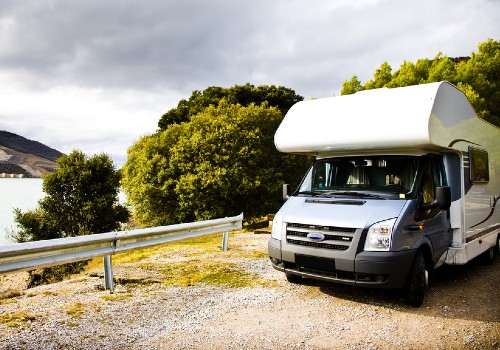
These parks, just off the highway, are favorite overnight stops for cross-country RVers looking for the comfort of a full-hookup site, laundry, or hot showers without having to drive miles off course.
Luckily, the in-an-out nature of these parks keeps crime low, but petty theft does happen. Surprisingly, the crimes occur often from other, less-honest RVers, who siphon off gas from your motorhome or tow vehicle or swipe items you left out as they are leaving the park, and you are still sleeping.
Price
RV park prices are rarely cheap. Unless you are taking advantage of an RV travel discount membership or are using a senior or military discount at a state or national park’s campground, a low nightly rate (under $25) will need more investigation.
The rate could reflect a bare-bones park with no sewer hookup or one with uneven sites that are rarely full.
The rate could also reflect an attempt by park owners to entice you to stay even though they have a horrible reputation for security issues.
Always dig a little deeper when you see a low price. If you can’t pinpoint why it’s so cheap, pass on the RV park as it may cost you plenty if something happens to you, the RV, or your belongings.
Management
Crime rates in an RV park are often directly related to how well management runs the park.
Experienced RVers can attest that managers who reside in the campground are safer parks for guests.
Why? Because managers will screen their guests and stay on top of safety issues, as the park is their “home,” and they want it safe for themselves.
Be leery when all the staff lives off-site. In many instances, this means the manager wants to rent the sites to paying guests and not staff, with no regard to whom they are renting, so the RV park income is higher.
No staff on site also increases the chances of off-hours problems that impact your safety like speeding guests, blown electrical boxes, loose pets, or broken fixtures in the bathrooms.
Full-time Resident Ratio
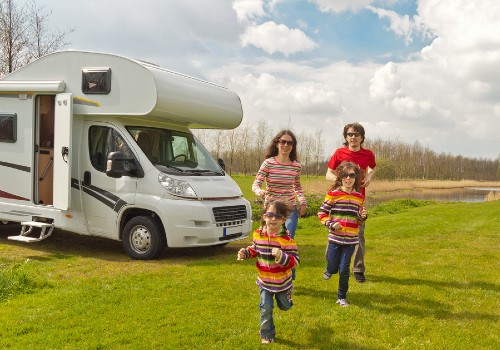
RV parks come in a variety of sizes and clientele, which newcomers to the RVing world may not understand.
So, what is a full-time resident, and why should it matter?
Many RV parks have such reasonable long-term rates (often around $500 monthly, while the nightly RV rate is $65) that people pull in a travel trailer and live there full time.
We are not talking about RVers who:
- Stay for several months, as “snowbirds” often do during the winter in southern RV parks
- Have a job, such as a traveling nurse, who prefer to stay in an RV
- RVers who want extra time to really immerse themselves in the local culture
Full-timers are residents of the RV park and if the campground caters to too many of them, it can really lower the overall safety of the normal RVing guests and becomes instead a trailer park.
Why? First off, full-timers often are locals down on their luck, and the park may be the only place they can afford to live. These park “residents” often invite over friends to hang out or even move in, who may or may not be upstanding citizens.
Full-timers also tend to become very lax about chaining up their dogs when they let them out for potty breaks. This common problem can lead to dogs running loose onto your campsite and could be a safety concern, especially if you have smaller children.
Security
The safest RV parks offer after-hours security patrols and often have a tall fence around the park’s perimeter. Many have gates at the entrance to further bar non-paying people from entering, which lowers the risk of theft or random crimes.
Remember that not all safety concerns at RV parks are people-related, as that tall fence can also keep out local wildlife, such as bears, coyotes, or alligators that can end up outside your camper door.
RV Park Safety Tips
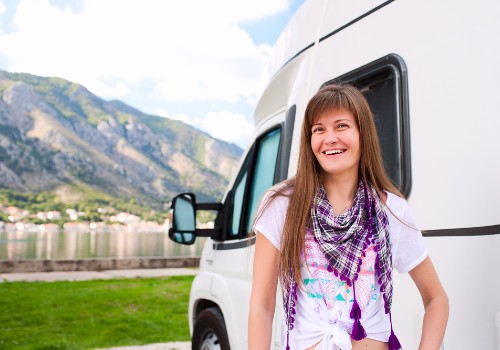
Polling active RVers from across the country reveals that very few ever have a run-in with criminals or have had to deal with property missing from their campsite.
Most RVers that visit RV parks have the same mindset: be cautious, yet enjoy the time off, make new friends, explore new sites, and help those in need.
Being cautious doesn’t mean being afraid. Next up are some great bits of advice to make your next RV park stay even safer.
Word of Mouth Recommendations
The best way to get a good read on a particular RV park’s safety is to ask around.
Friends, family, and fellow RV travelers you spot at gas stations or rest stops are always willing to share the lowdown on the RV parks they visit.
Chat up campground neighbors about the parks they felt the safest visiting and those you should avoid.
Another great source to locate safe RV parks is to check out online reviews that guests post about their stay. Look for a consensus from past guests on the park’s tone, including references to management, upkeep of amenities, and issues with full-timers.
Keep a running notebook with all the information you gain, both good and bad, as you never know when and where you will travel in your RV. The notebook is especially handy for the myriad of RV parks that have no website or online presence.
Arrive Before Dark
Want to Connect With a Community of Over 1,078 RV Enthusiasts?
Try to always arrive at an RV park before dark. Daylight provides the best visual of the surrounding area, how well management keeps up the park, and determine just how many, if any, long-term residents live there.
It’s incredible how many RV park websites have pictures taken from the best perspective with broken fencing or outdated shower facilities conveniently hidden from view.
Another reason to arrive early is to look out for general safety hazards you may not spot in the dark, such as:
- Ditches or drop-offs
- Low-hanging branches that can scratch up your RV
- Trees that can impede you from opening your slideout
- Extremely uneven sites
- Standing water (and the critters that like to slither in them)
- Piles of dog excrement left by your “friendly” neighbors
A quality RV park will gladly move you to a site more suitable to your needs, especially when you arrive during normal office hours where the staff is readily available to assist you.
Do a Drive-Through Before Paying
At any place new to you, do a drive-through (or walk-through) if possible before checking in. An RV park with a good reputation will have no issues with you inspecting the property.
Don’t like what you see, and you feel uneasy?
Don’t ever be afraid to cancel or forfeit your reservation fee if you feel unsafe at any park.
Secure Your RV
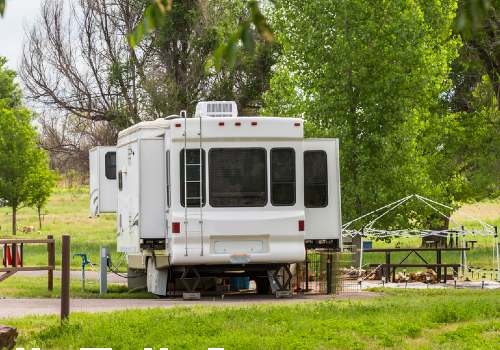
You finally get your RV site set up to your liking, and you’re ready to start relaxing, but that doesn’t mean leaving all your belongings outside for the duration of your trip.
While the chances are low anyone will mess with your stuff at an RV park, it can happen, so be diligent about locking expensive or sentimental items up inside your car, truck, or RV overnight.
Chain bicycles to the bumper of your RV, and get locking anti-siphon caps for your RV, vehicle, or boat. Always lock your doors at night and during the day if you’re away or taking a nap.
While most RVs have items of very little value to steal inside, it doesn’t matter to criminals looking to grab a phone, wallet, or purse sitting on the counter.
Buddy Up
It’s always a prudent safety measure at any RV park to go with another person to the bathrooms, showers, pool, or even on a walk. Never let kids wander around without adult supervision.
Even if you are of different sexes and can’t enter the same facility, stand outside and keep in speaking contact. You can never know what lurks around the corner, so having someone else to help keep an eye out is smart.
Weapons
While having a weapon for personal protection isn’t necessary, it can be a lifesaver in an emergency.
Guns are a ubiquitous “accessory” in the RV world, but many people who travel across state lines may find the different laws cumbersome.
If a gun makes you uncomfortable, consider other options such as a wooden or metal club, a stun gun (taser), pepper spray, or self-defense training.
Work through scenarios where you may have to brandish a weapon, so it’s in a convenient location if you need to use it.
Final Thoughts
Are RV parks safe? Yes, the majority of parks are safe, and it’s rare to find an RVer with a harrowing tale to tell when it comes to crime or unsafe conditions within a park.
Always remember that a bit of due diligence goes a long way when traveling in an RV, especially when safety is a top concern.
When you follow the tips above, you can increase peace-of-mind that your RV trip will go off without a hitch, and everyone will return safe and sound!
"Man cannot discover new oceans unless he has the courage to lose sight of the shore."
-- Andre Gide

